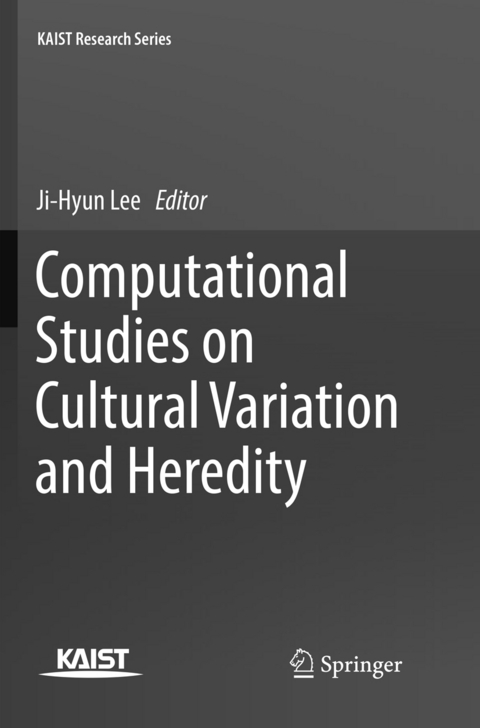
Computational Studies on Cultural Variation and Heredity
Springer Verlag, Singapore
978-981-13-4087-1 (ISBN)
This book explores the emerging concept of cultural DNA, considering its application across different fields and examining commonalities in approach. It approaches the subject from four different perspectives, in which the topics include theories, analysis and synthesis of cultural DNA artefacts.
After an opening section which reviews theoretical work on cultural DNA research, the second section discusses analysis & synthesis of cultural DNA at the urban scale. Section three covers analysis & synthesis of cultural DNA artefacts, and the final section offers approaches to grammar-based cultural DNA research.
The book places emphasis on two specific axes: one is the scale of the object under discussion, which ranges from the small (handheld artefacts) to the very large (cities); and the other is the methodology used from analysis to synthesis. This diverse approach with detailed information about grammar-based methodologies toward cultural DNA makes the book unique.
This book will serve as a source of inspiration for designers and researchers trying to find the essence, archetype, and the building blocks of our environment for the incorporation of social and cultural factors into their designs.
Ji-Hyun Lee is an Associate Professor at the Graduate School of Culture Technology in KAIST. She received her Ph.D. in School of Architecture (Computational Design) at Carnegie Mellon University writing a thesis about integrating housing design and case-based reasoning. Since joining the GSCT at KAIST, her research focus narrowed down to three interdisciplinary areas that are not mutually exclusive: (1) calculation for UX + service design, (2) cultural DNA with morphological analysis, and (3) computational creativity. These explorations result in computer-based frameworks or systems contributing to the enhancement of the calculability using algorithmic and/or heuristic computational methods. In other words, her research focus is on 'computational culture' as an extension of computational design.
THEME 1 Theories for Cultural DNA Research.- a) Research for Cultural DNA in Design.- b) A Design Gallery System.- c) Underlying Principles and Emerging Designs Based on Magic Squares.- THEME 2 Analysis & Synthesis of Cultural DNA at Urban Scale.- a) Multi-leveled Tridimensional Public Place and Urban Promenade.- b) Fingerprint of the City: How Old Country Roads become Fossilised within the Modern City.- c) Mods, Hacks, Makers: Crowdsourced Culture and Environment.- THEME 3 Analysis & Synthesis of Cultural DNA Artifacts.- a) How to Let Computers Know Building design Rules? - A KBimCode Mechanism to Translate the Sentences in Korea Building Act for the Automated Code.- b) A sense of dichotomy in household space and smartphone.- c) The Need for a Cultural Representation Tool in Cultural Product Design.- d) User Defined Conceptual Modeling Gestures.- e) A Universal Basic Robot.- THEME 4 Grammar-based Cultural DNA Research.- a) Paperless Grammars.- b) A practical shape grammar for Chinese ice-ray lattice designs.- c) Structures in shapes: a perspective from rules and embedding.- d) Grammatically Measuring the Functional Uniqueness of Murcutt’s Domestic Architecture.
| Erscheinungsdatum | 18.02.2019 |
|---|---|
| Reihe/Serie | KAIST Research Series |
| Zusatzinfo | 40 Illustrations, color; 76 Illustrations, black and white; VI, 225 p. 116 illus., 40 illus. in color. |
| Verlagsort | Singapore |
| Sprache | englisch |
| Maße | 155 x 235 mm |
| Themenwelt | Informatik ► Office Programme ► Outlook |
| Naturwissenschaften ► Geowissenschaften ► Geografie / Kartografie | |
| Sozialwissenschaften ► Soziologie | |
| ISBN-10 | 981-13-4087-0 / 9811340870 |
| ISBN-13 | 978-981-13-4087-1 / 9789811340871 |
| Zustand | Neuware |
| Haben Sie eine Frage zum Produkt? |
aus dem Bereich


